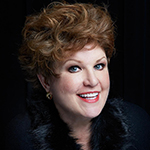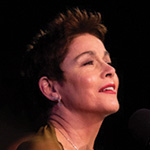The 29th New York Cabaret Convention
The Night and the Music:
Celebrating Rosemary Clooney, Barbara Cook, and Julie Wilson
Written and Hosted by Deborah Grace Winer
Rose Theater, NYC, October 10, 2018
Reviewed by Alix Cohen for Cabaret Scenes
Photos: Maryann Lopinto
Host Deborah Winer had close relationships with all three of the icons she salutes tonight, resulting in a book that shares the title of this show. Though the multifaceted writer/artistic director (nine years at the 92nd Street Y’s Lyrics & Lyricists, now active and independent) can be counted on to illuminate and entertain. Tonight is also personal.
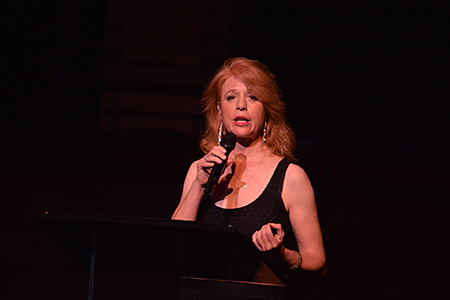
“Right after fire was discovered, people began to gather around it as one of their own held them spellbound with songs and stories. That was the first nightclub.” Winer points out that her honorees shared similar trajectories—incredible rises, steep falls, and reinvention during which each found her authentic voice. Tonight, we’re to hear stories and songs the ladies loved to sing.
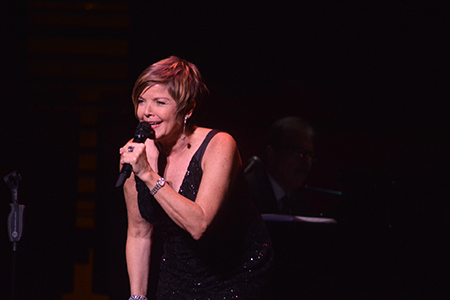
Karrin Allyson opens with one jazz treatment, one torch. The artist does both with equal panache.
https://www.ncil4rehab.com/wp-content/languages/new/antabuse.html
We watch as music seems to literally course through her body—she steps, bends, raises a knee, pats her side, turns, bounces—all with grace. Rodgers and Hammerstein’s “The Surrey with the Fringe on Top” resembles itself barely at all, while “Body and Soul” is gorgeously pristine. (New CD: Some of That Sunshine)
Clooney and her sibling first performed as sisters, moved on to Tony Pastor’s Band, and then Hollywood. Linda Purl’s swing number, “Them There Eyes,” represents band singing. Later, she offers a lilting “My Ship” (Kurt Weill/Ira Gershwin), hands behind her back at first, belief initially full, then ebbing away.
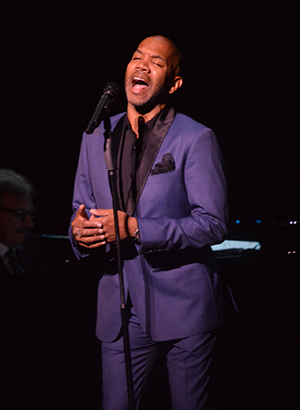
Cook “earned Broadway fame as the quintessential ingénue, but later embraced all kinds of music.” I’ve written before that Darius de Haas has an amazing instrument—control, range, style are all impressive. Leon Russell’s “A Song for You” epitomizes this, but emerges emotionless. Duke Ellington/Mitchell Parish’s “Sophisticated Lady” also accomplished, fares better, I think, because lyrics reflect observation.
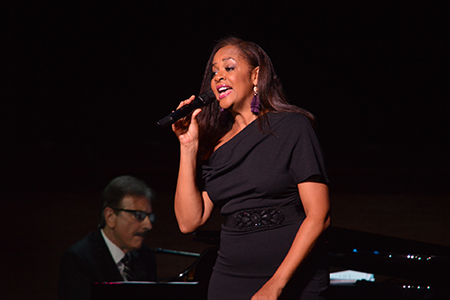
La Tanya Hall’s “Just One of Those Things” (Cole Porter) arrives bass-centric in masterful (Jay Leonhart) hands. Emphasis is subtle, sometimes elongated, very much her own. A velvet “When Sunny Gets Blue” (Marvin Fisher/Jack Segal) represents Cook’s southern roots, embraced later in her career. “That’s how she got her name,” Hall sings, crinkling her nose.
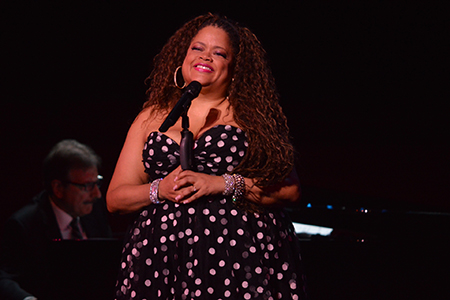
“When Barb was reborn as a cabaret singer, the midwife was Wally Harper, a great music director who also wrote her special material like this song.” Natalie Douglas does great justice to a superb arrangement of David Zippel’s light, happy “It’s Better with a Band.” John Oddo’s fingers move like Fred Astaire’s legs. Both this and Douglas’ later “How Long Has This Been Going On?” (George and Ira Gershwin) are performed with the vocalist’s elastic pipes in prudent check—the best of what’s written as written.
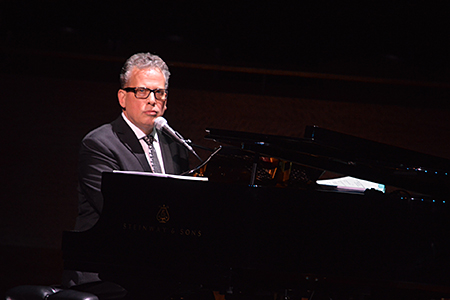
“Julie (Wilson) was from the prairie…a pioneer woman running around in sequins and a feather boa. On stage, she was the epitome of sophistication. She particularly liked Cy Coleman.” As performed by Billy Stritch, “Let Me Down Easy” (Cy Coleman/Carolyn Leigh) is a gentle bossa nova sung with gravity, grace, and the kind of piano music that makes one want to sit under the instrument.
Flawless.

Nicolas King stands in for countless young performers nurtured by Wilson. The artist commands a stage with well-honed ease, punctuates with his hands (don’t let them stray to your pockets), and is one of a few performers tonight who looks AT his audience. Offering a softer side in Act II, he enchants with two intimate ballads: “I Fall in Love Too Easily” and “Blame It on My Youth.” “My heart should be well schooled,” he sings, then biting his lip.
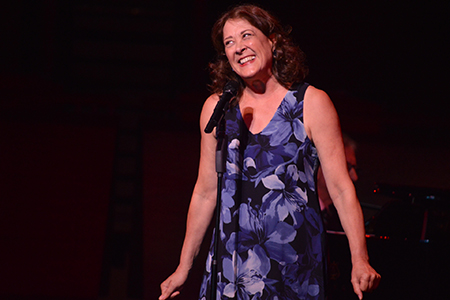
“Rosemary and Barbara had something in common. They were both hilariously funny… Barbara loved this song. Karen Ziemba’s “My Dog Loves Your Dog,” (Ray Henderson/Jack Yellen/Irving Caesar), replete with canine sounds, is utterly charming. The performer, an able actress, manages to keep lyrics from being cloying and imbues them with warmth. Irving Berlin’s “Count Your Blessings Instead of Sheep” emerges a true lullaby. Even during musical break, Ziemba holds the floaty mood. Billie Holiday was a big influence on Rosemary Clooney. She volunteered to be the Godmother of Clooney’s children: “It takes a bad woman to be a good Godmother.”
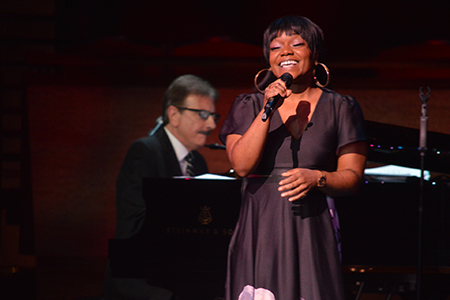
Kenita Miller sings “God Bless the Child” (Billie Holiday/Arthur Herzog, Jr.) in a gospel voice packaged as theater, i.e., despite wail, she brings it down to human scale. “And Then There’s Maude (Maude’s Theme)” (Alan and Marilyn Bergman/Dave Grusin) is effervescent.
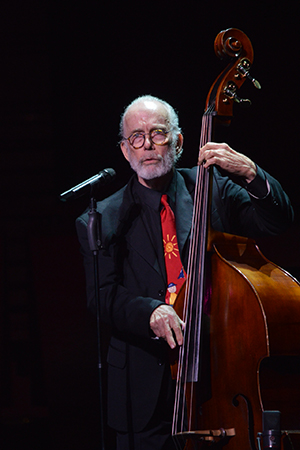
“When Rosey played Rainbow and Stars, I used to hang out with the band” introduces Jay Leonhart who was in that band. The bassist tells us Clooney didn’t have patience for sound checks, so musicians often stood in for her. He sang “Hey There” (Jerry Ross/Richard Adler) under these circumstances. For those of you who don’t know, Leonhart is a simply wonderful singer. Phrasing is impeccably conversational, scat ever casual and cool.

“Barbara (Cook) was a lyric soprano into her middle 80s, the eighth wonder of the world after The Hanging Gardens of Babylon” introduces Laura Shoop’s legitimate voice. In Act II, the vocalist sings “Vanilla Ice Cream” (Sheldon Harnick/Jerry Bock from She Loves Me) with technical skill and theatrical ham. Harnick, a big fan of Winer, is in the audience tonight. James Naughton’s “The Folks Who Live on the Hill” (Jerome Kern/ Oscar Hammerstein II) represents Clooney’s marriage at age 70 “for the grandchildren” to her partner of 25 years. “I made a smarty pants offer to give her a bridal shower, but she took me up on it.” (Her wedding banquet consisted of White Castle burgers and barbecue.) Though stiff during this number, Naughton loosens up a bit with an Act II blues, “I Ain’t Got Nothin’ but the Blues.” He seems to be singing above the notes which sounds awkward.
We hear briefly about Clooney’s nervous breakdown, Cook’s substance abuse and aging out of ingénue parts, and Wilson’s going back to Omaha to care for an aging mother. Each began again in small clubs, eventually rising to new prominence. “All three women said that only later in their careers could they do the kind of material they preferred.”
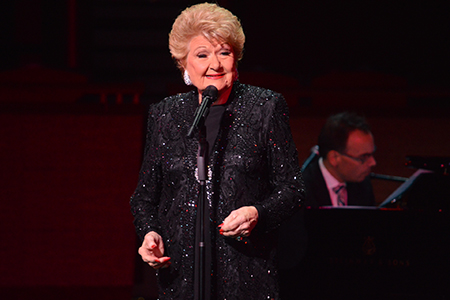
What can one say about Marilyn Maye—we are her people. The audience erupts. Maye was a good friend of Wilson’s. At Winer’s request, she opens with “a song Julie did,” Stephen Sondheim’s “I’m Still Here.” The smallest gesture is spot on.
https://www.ncil4rehab.com/wp-content/languages/new/propecia.html
Every word is perfectly natural. Maye wears the number like a bespoke jumpsuit. When vocal swells, Firth’s whomping (symbiotic) piano never overwhelms. Later, Maye performs three more persuasive songs about living every day with consummate veracity: “As Time Goes By,” “Secret o’ Life,” “Here’s to Life.” She’s a lighthouse. (Tedd Firth-Piano)
We close with Billy Stritch’s “Will You Still Be Mine?” (Matt Dennis/Thomas Adair). The answer from the audience is a resounding “yes!” “Cabaret’s power is in how fragile it is. You have to be there live in the dark. The compact is at the edge of night, when the candle goes out and music lingers…Rosemary said a great song is about ‘listen, I want to tell you something.’”
All unattributed quotes are Deborah Grace Winer.
John Oddo (pianist/music director); Jay Leonhart (bass); Ray Marchica (drums)



